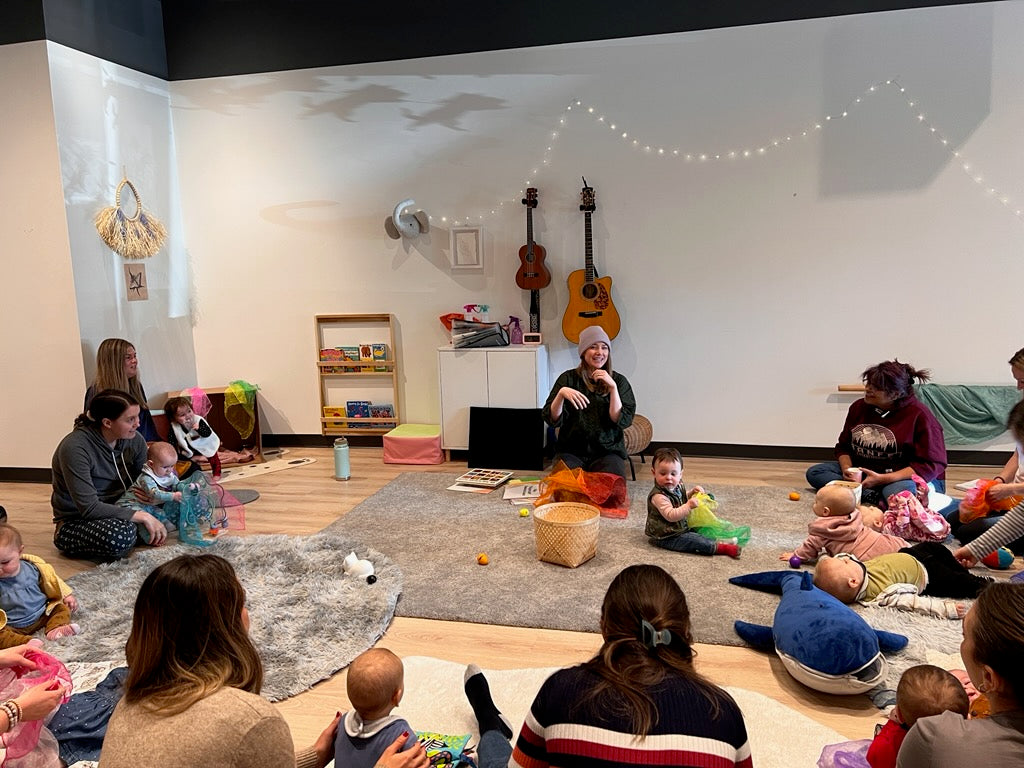Fostering Speech and Language Development

Last week at "The Nook" we had the opportunity to talk with Carly, Vancouver pediatric speech-language pathologist and co-founder of Weetalkers.com, about how we as parents and caregivers can foster speech and language development in our children.
What parents and caregivers do makes such a difference in your child's language development and this goes far beyond just talking. Language is the foundation for our relationships with others, for when they are starting school, so we want our little ones to build a very strong foundation with their language skills.
Talking with your baby is crucial and research shows that we want to make sure these are responsive interactions. Think of it as a tennis match; baby initiates a sound or gesture, that's the serve. You reply with a word, gesture, or smile, that's the return. For example, baby shakes a shaker, that's the serve. You reply, "You're shaking it." That's building a connection in their brain with the meaning of that word and it makes what you're saying that much more meaningful to them because they started that interaction.
You don't need to be talking to your baby every moment, but you can use your daily routines, diapering, feeding, bathing, etc. as great opportunities that are rich for language development and connection where the focus is on them and what they are experiencing. It's not extra work for you, you can just use these moments to be present and focused.
It's never too early or too late to be reading with your baby. Exposing them to reading early on is very beneficial. You can take their lead with whether you read every word on the page or scale it down to what they are interested in at the given moment. You can make book time a conversation. You can talk about what's on the page. Use an animated voice. Books will grow with your child as you look at more detail and talk about what's happening in the book.
Singing, especially with gestures, slowed down and stretched out is wonderful for language development. Rhyming and rhythm prepare children for reading. Jess reassures parents that it's less about musicality and more about showing our children that we can be fearless and do things that seem hard and they respond in a profound way. Children that are given the gift of learning to be confident are really highly successful in many areas of their life. It is not about doing something perfectly and singing is like that. If you are doing it joyfully and with confidence they will do the same. It's about connecting.
In the same vein, some parents will say, "My child is very shy" and it's important to clear away the judgement perspective, letting a moment unfold naturally and not speaking for our children, allowing some time and space for children to respond.
Carly explains that today, everything is thrown at us as though we HAVE to do it. Classes like baby signing are great for all babies, but not necessary for language development in hearing children. It can be fun and helpful for your baby to be able to communicate some things like "more" or "all done", "milk", "water" before they can talk, but the development of speaking will come anyway.
Be aware of non-verbal communication from your child. A child will realize, "When I do this, my parent will do that." That's a concept they will need to know before they begin to speak. "I'm having this impact on my environment..." with first gestures, then sounds, then words.
Now a few FAQs for parents:
Bilingual or multi-lingual families:
In Vancouver, people are sometimes concerned that if they speak two or more languages to their child that it will cause a speech and language delay. That is a myth. You are providing your child with a very rich experience and connection to your culture by speaking more that one language to them. There is a huge body of evidence to support this. Babies have an incredible capacity to learn language and other skills at this age. Just think they go from cooing and babbling to talking in full sentences in a matter of three years. Some parents have anxiety, either about speaking two languages at home or over having waited too long to begin speaking to their child in their second language. But know that there is still an incredible window for learning new languages up to age 6. In multiple language households, try to speak the same language in the same sentence as different languages use different sentence structures.
Ear Infections:
Frequent ear infections can have an impact on speech and language development because the ears are frequently blocked, possibly impacting hearing. If your child has experienced multiple ear infections and this is a concern be sure to have your child's hearing checked. In BC, hearing checks are routinely done for babies who are born in hospital, but if you had a home birth you may also want to have your child's hearing checked.
Gender Differences:
Research does show that boys talk later than girls, but only by a matter of months, so they are still meeting the same milestones, just maybe a little later in the range.
For more information on the services they offer and some wonderfully useful tips you can use at home visit www.weetalkers.com or @weetalkers
Contributed by Shauna Farrell
Join us at The Nook on Dec. 21st at 11:45AM when Shira Laye offers us foundational understanding of Making Sense of Children's Emotions through the Hand in Hand approach.
